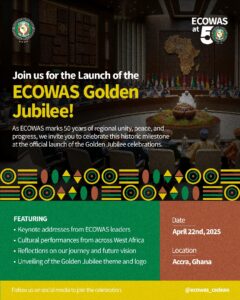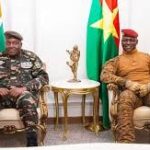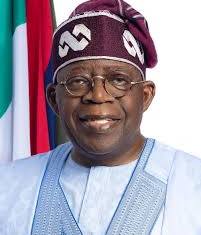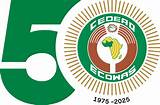ECOWAS at 50: Powering Achievement of Cooperation, Peace, Trade, and Unity in West Africa. By Raymond Enoch
In a region often challenged by instability, economic volatility, and leadership transitions, the Economic Community of West African States (ECOWAS) has emerged as a quiet but consistent force for unity, peace, and progress. As the Commission inches closer to its golden jubilee, its portfolio of milestone achievements continues to reshape the narrative of regional integration across West Africa.
Founded in 1975 with a vision of fostering economic cooperation among its 15 member states, ECOWAS has gradually expanded its role into a full-spectrum regional powerhouse—championing democracy, building institutions, advancing infrastructure, and deploying troops when necessary to restore peace.
Among its flagship programs is the ECOWAS Trade Liberalization Scheme (ETLS)—a blueprint for tariff-free trade that has significantly enhanced the free movement of goods and services across borders. This scheme helped lay the foundation for the region’s integration into the African Continental Free Trade Area (AfCFTA), positioning West Africa as a growing hub for intra-African commerce.
ECOWAS has also entrenched robust institutions designed to support regional governance. These include the ECOWAS Parliament and the ECOWAS Court of Justice, both headquartered in Abuja, Nigeria. These bodies promote legislative collaboration, judicial oversight, and the protection of human rights across the region. The Commission Headquarters itself serves as the policy nerve center, coordinating initiatives and monitoring compliance.
However, ECOWAS’ most celebrated contributions lie in the realm of peace and security. In the 1990s, the bloc made history through the creation of ECOMOG—a multilateral peacekeeping force that restored stability in Liberia and Sierra Leone amid brutal civil wars. Today, this legacy continues through the ECOWAS Standby Force (ESF), a regional security architecture designed for rapid deployment in conflict zones.
Supporting this is the ECOWAS Early Warning and Response Network (ECOWARN), a sophisticated tool for gathering and analyzing data to pre-empt and manage crises before they spiral out of control.
The bloc’s commitment to democracy has been tested and proven time and again. ECOWAS played a pivotal role in restoring democratic governance in Ivory Coast, and has been instrumental in promoting peaceful transitions and upholding constitutional order in Guinea Conakry and Guinea-Bissau, even amid repeated political upheavals.
On the economic development front, the establishment of the West African Monetary Institute (WAMI) in Ghana is paving the way for a long-envisioned single West African currency. This would simplify transactions, enhance trade, and strengthen the region’s financial independence. Meanwhile, the ECOWAS Bank for Investment and Development (EBID) continues to fund critical infrastructure projects, empowering nations with improved roads, bridges, and public services.
In the energy sector, ECOWAS is lighting up the region through the West African Power Pool (WAPP)—an ambitious initiative to interconnect national electricity grids. This is already improving access to power in rural and urban areas, while reducing reliance on expensive and polluting generators.
Agriculture—an economic mainstay for most ECOWAS nations—has also received a strategic boost through the West African Agricultural Productivity Program (WAAPP). This program empowers farmers with research-driven solutions, new crop varieties, and technology that enhance food security and climate resilience.
Not to be overlooked is the role of ARA, the Agency headquartered in Lomé, Togo. This is a crucial institution that ensures the safe coordination of food reserved —vital for food security.
Despite these strides, ECOWAS is not without its challenges. The region still contends with terrorism, military coups, youth unemployment, and border tensions. Yet, its track record suggests an enduring commitment to innovation, integration, and intervention—when necessary.
Recently ECOWAS partnered with SONGHAI to provide training for youth in Agriculture, beside providing almost ninety six ( 96) youths in ECOWAS member states the opportunity to be placed in ECOWAS specialized institutions and agencies.It launched a Tournament including female tournament the first of its kind in West Africa in Abuja Nigeria.
As ECOWAS marches toward its 50th anniversary in 2025, its journey stands as a testament to the potential of African unity, cooperation, and leadership rooted in homegrown solutions.
Raymond Enoch is a Journalist, West African affairs analyst, and policy researcher with experience of reporting on ECOWAS, regional diplomacy, and continental development. Based in Abuja, Nigeria, he has written extensively on political transitions, peacebuilding, and governance in Africa.









